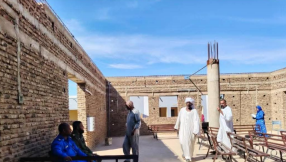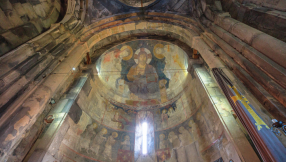The Archbishop of Canterbury today called for "gracious reconciliation" in the Church of England as it continues to negotiate the divisive issues of homosexuality and women bishops.
In facing the prospect of working with those who deeply disagree, Archbishop Welby used his presidential address to the Church of England General Synod to call for a renewed focus on showing love.
"There is going to have to be a massive cultural change that accepts that people with whom I differ deeply are also deeply loved by Christ and therefore must be deeply loved by me, and love means seeking their flourishing," he said.
He called on the Church to exhibit a love of the kind described in 1 John 4:18, which says "perfect love casts out fear".
"We all know that perfect love casts out fear. We know it although we don't often apply it," he said.
He pointed to the importance of the Church staying together in the midst of disagreement and how this could be an excellent witness to wider society.
"A Church that loves those with whom the majority deeply disagree is a church that will be unpleasantly challenging to a world where disagreement is either banned within a given group or removed and expelled," he said.
The General Synod in London this week saw the Church clear the way for a final push towards its first women bishops, after a lengthy and often agonising process to agree legislation that could bridge the divide between supporters and opponents.
However, another controversy hanging over the Church is the Pilling Report, which controversially recommended that the Church "warmly welcome and affirm the presence and ministry within the Church of gay and lesbian people, both lay and
ordained".
In the face of such deep divisions, Archbishop Welby vigorously denied that gracious reconciliation was "wishy-washy"
Instead, he described the reconciliation the Church has been working towards as "exceptionally hard edged, extraordinarily demanding and likely to lead in parts of the world around us to profound unpopularity or dismissal".
Speaking specifically about the Pilling report, the Archbishop acknowledged the two main fears felt in the Church on this issue.
"There is a great fear that it will lead to the betrayal of our traditions, to the denial of the authority of scripture, to apostasy," he said.
"And there is also a great fear that our decisions will lead us to the rejection of LGBT people, to irrelevance in a changing society, to behaviour that many see akin to racism."
While acknowledging these concerns, he appealed to the Church to avoid entering into a situation of a zero sum game, where one party's gain necessarily means the other's loss.
"It is an old problem in game theory," the Archbishop said. "The moment at which something is zero sum, players stop looking so much at their objectives and increasingly look at each other.
"The more they look at each other, the more they are dominated by fear and the less they are able to focus on their objectives."
Calling on members of the Synod to focus on the objective of moving forward together, he said: "We have to find a way forward that is one of holiness and obedience to the call of God and enables us to fulfil our purposes. This cannot be done through fear. How we go forward matters deeply, as does where we arrive."
He welcomed the Pilling Report's recommendation for the Church to embark on a series of facilitated discussions on human sexuality.
"Facilitated conversations may be a clumsy phrase, but it has at its heart a search for good disagreement," he said.
Calling for the Church to be innovative and encourage engagement rather than confrontation, Archbishop Welby declared: "If we are to challenge fear we have to find a cultural change in the life of the church, in the way our groups and parties work, sufficient to build love and trust.
"That will mean different ways of working at every level of the church in practice in the way our meetings are structured, presented and lived out and in every form of appointment."
He pointed to "courageous churches" in Nigeria, Kenya, and Uganda as examples of how the Church of England should approach the difficulties that lie ahead.
"They are not sinless, but they are heroic," he said of the Churches. "That heroism should challenge us not simply to follow what they say but to be those whose heroic faith is truly holy and gracious."













